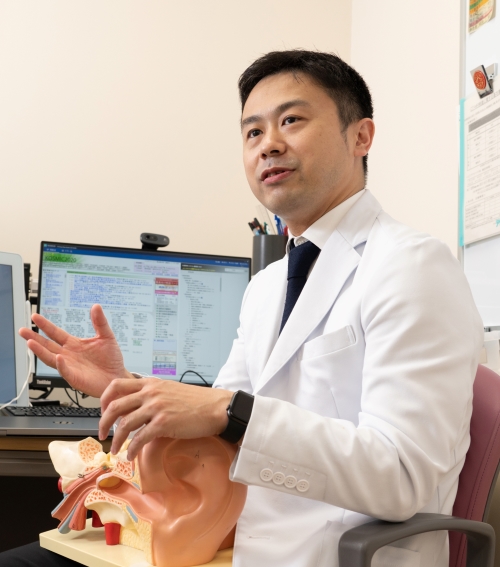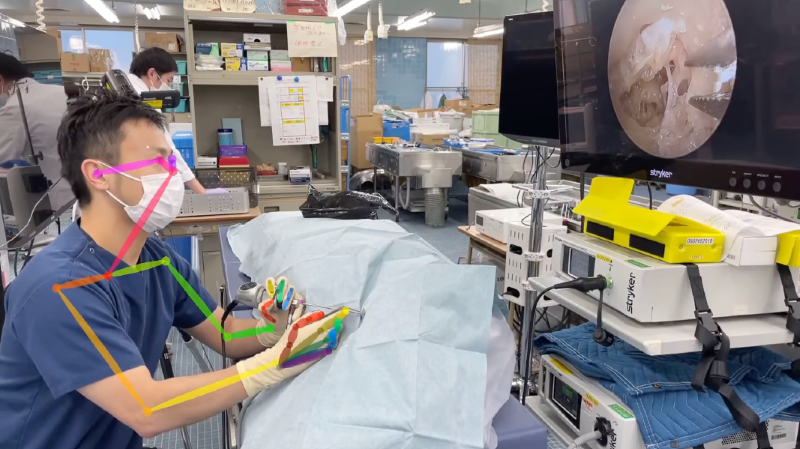
Physicians are extremely busy. They bear great responsibilities for their patients' lives and QoL (Quality of Life), and spend the majority of their time in consultation with patients or performing surgeries. Dr. FUJITA Takeshi of the Graduate School of Medicine specializes in ear surgery and hearing loss. In addition to providing medical care at Kobe University Hospital, he is also conducting multidisciplinary joint research with researchers in the engineering field to develop a new device that will be useful for precisely diagnosing sensorineural hearing impairment.
There are different types of hearing loss. Conductive hearing loss occurs due to an impairment in a part of the ear that conveys sound vibrations (such as the eardrum). Sensorineural hearing loss occurs due to a problem in the inner ear, which converts vibrations picked up by the eardrum into electronic signals that are conveyed to the brain. 90% of hearing loss is caused by impairment to the cochlea- a tiny (approx. 5mm) organ in the inner ear.
However, it is not possible to visualize the cochlea using CT and MRI scans because it is a minute organ covered by the skull, therefore treatment is provided without knowing what exactly is occurring in the inner ear. "The only treatment for sudden onset hearing loss is steroid medication, however if we could determine the cause (whether it be inflammation, circulation issues or nerve damage) and reconceptualize this disorder, we could develop appropriate treatment strategies." says Dr. Fujita. "The treatment of hearing loss hasn't progressed in decades. I would like to bring about a breakthrough."
Based on advice from medical engineering experts at Kobe University, he is focusing on terahertz waves, which have high penetrability but have yet to be used in the medical field. Dr. Fujita then emailed Osaka University's Institute of Laser Engineering, which has been researching terahertz waves, with a request for collaboration.
The Japan Science and Technology Agency (JST) has selected the resulting research project entitled 'Towards minimally invasive, high resolution diagnosis of sensorineural hearing loss through medical engineering' for its Fusion Oriented Research for disruptive Science and Technology (FOREST) program. The joint research project began in 2022 and will continue for 7 years.
"My interest in collaborative research between medicine and engineering goes back to 2014 when I was studying at Harvard University." Dr. Fujita explains. "While there I observed how otolaryngologist Dr. Konstantina Stankovic, who became a physician after graduating from MIT, led collaborations with the engineering field. I decided I wanted to try conducting collaborative research between medicine and engineering when I returned to Japan." (Dr. Stankovic is currently a professor of Stanford University's School of Medicine.)

Dr. Fujita is also working on the development of a surgical robot for ear surgery. "If we can use the robot to analyze and convert expert ear surgeons' precise movements into numerical data, I think it will be possible for more doctors to be able to safely perform these surgeries."
Dr. Fujita has many other duties such as seeing patients and teaching students in Kobe University's School of Medicine, therefore he conducts this collaborative research in the evenings and on days off. "Even though I have wondered whether it would be best to prioritize the treatment of many patients over research, I am conducting this project because I believe that the ideas of working physicians are tied to the development of future medicine."
Profile: FUJITA Takeshi
Physician and lecturer, Otolaryngology-Head and Neck Surgery, Kobe University Graduate School of Medicine
Dr. Fujita graduated from Kobe University's School of Medicine in 2005. After completing his residency, he started working in the Otolaryngology (Ear-nose-throat) department of Kobe University Hospital. He studied abroad at Harvard University in the USA from 2014 to 2015, before returning to Kobe to take up his current position in 2019.






